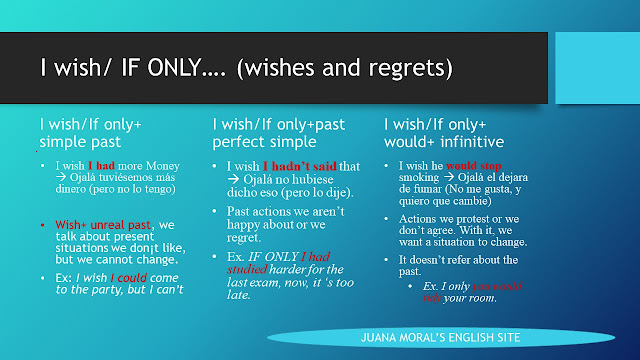Conditional sentences are widely used in order to explain the conditions necessary for something to happen. Related to impossible conditionals (third conditionals), the expressions I wish (desearía) and If only (ojalá...) are used to express wishes and regrets. In the following picture we can see the three structures and their meanings.
 |
| I WISH/ IF ONLY. WISHES AND REGRETS. JUANA MORAL'S ENGLISH SITE |
Together with this, you can also find the structures.
- I'd rather you+ simple past. (preferiría que tu hicieras/no hicieras....)
- Ex: I'd prefer to stay home tonight: I'd rather you stayed home tonight (preferiríá que te quedases en casa esta noche) El pasado simple sirve para marcar el subjuntivo. Se usa cuando el que debería realizar la acción no es el hablante
- Attention. I'd rather+ infinitivo: I'd rather stay home (preferiría quedarme en casa) se usa para indicar lo que alguien preferiría y que también el hablante realiza la acción.
- It's (high) time +subject+ past form (ya es hora de que hagas....)
- Ex: I'd prefer to stay home tonight: I'd rather you stayed home tonight (preferiríá que te quedases en casa esta noche) El pasado simple sirve para marcar el subjuntivo. Se usa cuando el que debería realizar la acción no es el hablante
- Attention. I'd rather+ infinitivo: I'd rather stay home (preferiría quedarme en casa) se usa para indicar lo que alguien preferiría y que también el hablante realiza la acción.
- I't a long time since you haven't bought any clothes. It's high time you bought some new clothes. No se refiere al pasado, si no que indica un subjuntivo.
SEE ALSO
- CONDITIONAL SENTENCES. Click here
- Actitivites with a key. Click here.
- Activities with a key. Agendaweb. Clikc here
- I wish/ If only. Speaking activity. Random wheel
No hay comentarios:
Publicar un comentario